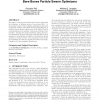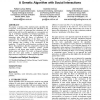25 search results - page 4 / 5 » The theory of deadlock avoidance via discrete control |
GECCO
2007
Springer
14 years 14 days ago
2007
Springer
We apply a novel theoretical approach to better understand the behaviour of different types of bare-bones PSOs. It avoids many common but unrealistic assumptions often used in an...
GECCO
2009
Springer
14 years 26 days ago
2009
Springer
We propose a variation of the standard genetic algorithm that incorporates social interaction between the individuals in the population. Our goal is to understand the evolutionary...
CDC
2009
IEEE
13 years 11 months ago
2009
IEEE
We consider a plant the dynamics of which switch among a family of systems. Each of these systems has a single stable equilibrium point. We assume that a constraint region for the...
RTSS
2003
IEEE
13 years 11 months ago
2003
IEEE
We describe the Timed Input/Output Automata (TIOA) framework, a general mathematical framework for modeling and analyzing real-time systems. It is based on timed I/O automata, whi...
HYBRID
1998
Springer
13 years 10 months ago
1998
Springer
This paper investigates how formal techniques can be used for the analysis and verification of hybrid systems [1,5,7,16] -- systems involving both discrete and continuous behavior....


